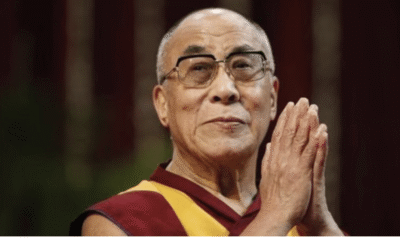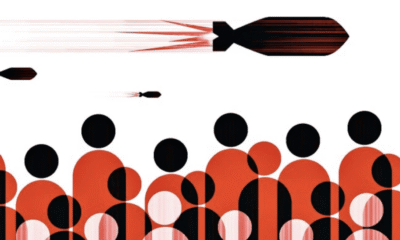
|
Getting your Trinity Audio player ready...
|
Three major partitions happened in the world in the second half of the 1940s. Germany was partitioned into the Eastern and Western blocs in 1945, followed by India into Hindustan and Pakistan in 1947. Finally, Israel was created by partitioning Palestine in 1948.
Germany’s partition was temporary. The Berlin Wall, constructed in the early 1960s to accord permanence to it, was dismantled by the Germans in less than three decades. The country was reunified in 1989.
But in India and Palestine, partition was a terrible affair, leading to a full-scale war in Israel and mass migration accompanied by mind-numbing violence in India.
The Arab-Israel war at the time of the partition of Palestine in 1947-49 caused the death of over 30,000 people. But the death and destruction caused at the time of India’s Partition were horrifying.
More than a million were murdered, while many millions more had to endure a treacherous migration across the hastily created border, often on foot. Hundreds of thousands could not make it, as they were waylaid and butchered.
Those horrors are difficult to forget. Historian William Dalrymple, in an article in New Yorker, quotes from a book by Nisid Hajari, Midnight’s Furies, about the brutality of the period: “Gangs of killers set whole villages aflame, hacking to death men and children and the aged while carrying off young women to be raped. Some British soldiers and journalists who witnessed the Nazi death camps claimed Partition’s brutalities were worse: pregnant women had their breasts cut off and babies hacked out of their bellies; infants were found literally roasted on spits.”
The Partition of India was a meaningless and reckless act. Mahatma Gandhi opposed it saying: “Vivisect me before vivisecting the nation”. Sardar Vallabhbhai Patel vowed to fight till the end to reject it. Rajendra Prasad conclusively proved its irrationality in a thoroughly argued 1946-book, India Divided.
Across the border, for Saadat Hasan Manto, the famed author, it was all sheer madness. Those women raped, with bulged stomachs, distressed him. “Where should those bellies belong to — Hindustan or Pakistan?” Manto questioned in innocent grief. His dark satire on Partition-time madness, Toba Tek Singh, ends with his eponymous hero Tek Singh seen stranded on no-man’s land between the newly created India and Pakistan. “On one side, behind barbed wire, stood together the lunatics of India and on the other side, behind more barbed wire, stood the lunatics of Pakistan. In between, on a bit of earth which had no name, lay Toba Tek Singh”, Manto provocatively demurs.
Partition was not inevitable even until the early 1940s. But then, the British were in a hurry to leave. Louis Mountbatten arrived in India in March 1947 with the mandate to free the country before June 1948. After meeting Mohammad Ali Jinnah, “a psychopathic case”, Mountbatten decided not to wait for that long. In June, he unilaterally declared that the British would partition India and leave in less than three months.
Gandhi could not reconcile to the fact that a “maniac” and “an evil genius” like Jinnah could have his way, and retreated to Bengal to attend to the victims of the bigotry and brutality of its rabid communalist premier, Hussain Suhrawardy. Jawaharlal Nehru, who once called Partition “fantastic nonsense”, reconciled quickly and declared in April 1947, “I want that those who stand as an obstacle in our way should go their own way.”
In India, Rajendra-babu became the first president of partitioned India, and Nehru its first Prime Minister (PM). In Pakistan, Manto was branded a traitor and thrown into jail, and died a broken man in 1955 at the age of 42.
For Hindus, Partition was not merely a loss of territory; it was the vivisection of their revered motherland. The urge for undoing it and reclaiming that lost territory, Akhand Bharat, remains a fervent dream for many of them, as Israel remained for the Jews for over two millennia.
The partition of Germany was rejected by people on both sides of the Wall. They pulled it down and ended the colonial game. Both the last PM of East Germany, Lothar de Maizière, and the leader of Opposition, Richard Schröder stood by their people. Despite domestic opposition in the Soviet Union, Mikhail Gorbachev demonstrated statesmanship by not interfering.
Unfortunately, the Partition of India was not just about land, but about minds. The premise was that Hindus and Muslims cannot live together. Jinnah, who was once hailed as “the Ambassador of Hindu-Muslim Unity” and had disparagingly dismissed the propaganda about Hindu domination as just “a bogey, put before you (Muslims) by your enemies to frighten you”, turned the tables by the 1940s and maniacally argued that they could never live together. He won.
The first step to Akhand Bharat would be to bottle the Jinnah genie. Partition-time memories should help mitigate the wounds that communities nurture and end the mental and emotional divide, not exacerbate it further. “This day will not only inspire us to eliminate the poison of discrimination, animosity and ill will, but it will also strengthen unity, social harmony and human sensibilities,” PM Narendra Modi fervently hoped when he recently called for the Partition Horrors Remembrance Day to be observed every August 14. May the day be marked with this spirit.
(The article was originally published in Hindustan Times on August 19, 2021. Views expressed are personal.)



